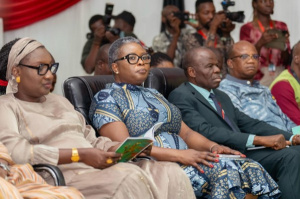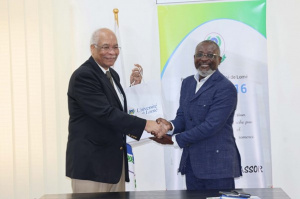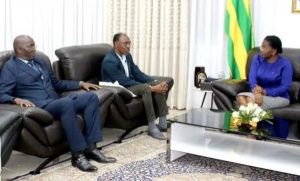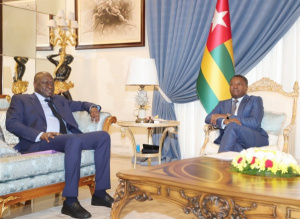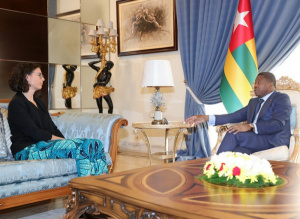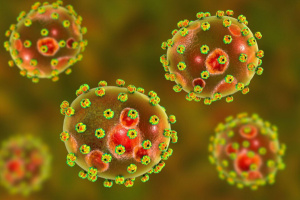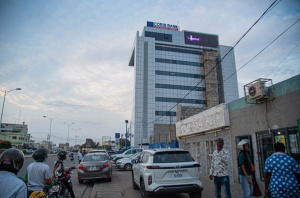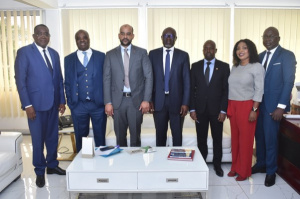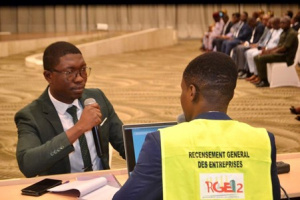Togo First
FESPACO 2025: Togo and Burkina Faso Discuss Cultural Cooperation
Togo and Burkina Faso are working together on cultural projects at the 2025 Ouagadougou Pan-African Film and Television Festival (FESPACO). This festival is a big event for African movies.
On February 22, 2025, Togo's Minister of Communication, Media and Culture, Yawa Kouigan, met with Burkina Faso's Prime Minister, Rimtalba Jean Emmanuel Ouédraogo. They talked about how important cinema and culture are for West Africa's growth.
“Cinema and culture do not require official agreements to thrive, they are naturally imposed by the fraternity between African creators,” Ms. Kouigan said. She praised the strength of the African film industry.
Togo sent a team of 50 film professionals to the festival. They have six films competing in different categories like film criticism, series, animation, and more. Togo was honored at the last FESPACO in 2023.
University of Lomé to Host African Conference of Physics 2025
The University of Lomé in Togo will host the African Conference of Physics from September 14 to 20, 2025. This conference brings together international researchers, educators, and decision-makers to strengthen scientific cooperation and promote physics research in Africa.
The event’s organizing committee made the announcement official during a trip to Lomé on February 18, 2025. Led by Dr. Horst Severini from the University of Oklahoma, the committee met with Professor Adama Mawulé Kpodar, President of the University of Lomé, to discuss the conference details and inspect the facilities.
The conference will focus on key areas like astroparticle physics, renewable energies, and medical physics. These areas are important for technological development in Africa. Hosting this event positions the University of Lomé to become a major player in scientific innovation in the region and attract more partnerships.
This article was initially published in French by Ayi Renaud Dossavi
Edited in English by Ange Jason Quenum
Togo Again Takes Helm of GIERAF for Two Years
Over the next two years, a Togolese will head the Inter-African Fertility Research and Application Study Group (GIERAF). The new president, Dr. Jean Claude Kolani, takes the baton from Coulibaly Founzégué Amadou. Kolani was appointed after the group's 9th congress held in Lomé from February 20 to 22, 2025.
The congress’ latest edition focused on addressing infertility challenges in Africa, highlighting medical advancements and prevention strategies. During the event, the GIERAF management team met with Togo's Prime Minister, Victoire Tomégah-Dogbé, who expressed the government's support for the group's mission.
Founded in 2009 in Lomé, the GIERAF includes 15 countries from West and Central Africa. The group is dedicated to enhancing infertility management through research and medical training. The group’s first president was also a Togolese, Dr. Moïse Fiadjoe. Fiadjoe led the body from 2009 to 2011.
Ayi Renaud Dossavi
Women Empowerment: World Bank VP West, Central Africa Praises Togo
Over the recent years, Togo has made major progress in women's empowerment. Ousmane Diagana, World Bank Vice-President for West and Central Africa, made the statement in a meeting with Togolese President Faure Gnassingbé in Lomé on February 25, 2025.
Diagana credits Togo's achievement to its strong tradition of women leaders, like the Nana-Benz, who have played a crucial role in the country's economy. “We have studied this example closely and want to share it with other countries. What matters is these women's contribution in both the government and private sector,” he said.
Le Président de la République, Faure Essozimna Gnassingbé s’est entretenu ce mardi 25 février 2025 à Lomé avec Monsieur Ousmane Diagana, Vice-président de la Banque mondiale pour l’Afrique de l’ouest et du centre.https://t.co/1LUclGPZMm pic.twitter.com/kqR7fmGk1V
— Présidence Togolaise/Togolese Presidency (@PresidenceTg) February 26, 2025
Togo's achievements are highlighted in the World Bank's “Women, Business and Law 2024” report, where it scored very high—97.5 out of 100. The index puts Togo at the best in Africa relative to promoting women's rights.
Over the past decade, Togo has launched several initiatives to help women financially and economically. In 2024, for example, it launched a major project, the National Fund for Inclusive Finance, which provides special financing to women and young people so they can contribute more to the economy.
This article was initially published in French by Esaïe Edoh
Edited in English by Ola Schad Akinocho
Togo-UK: Ambassador Thompson Explores Path to Greater Cooperation with President Gnassingbé
President Faure Essozimna Gnassingbé of Togo met with UK Ambassador Harriet Thompson on February 26, 2025. The meeting focused on fostering the cooperation between the two countries. They covered key economic areas like trade and investment.
"Our companies want to work with local businesses, invest, and trade more with Togo," said Ambassador Thompson. They also discussed how to cooperate more on the defense and security fronts, especially relative to fighting terrorism and sharing experiences to make the region more stable.
Ambassador Thompson praised President Gnassingbé’s efforts to preserve peace and stability in West Africa.
Last year, a delegation of British investors was in Togo to explore business opportunities. They had visited the Adétikopé industrial platform, among others.
Gozem Secures $30 Million to Expand Across French-Speaking Africa
Transport technology platform Gozem has raised $30 million to speed up its expansion in French-speaking Africa. The financing, including equity and debt, is led by SAS Shipping Agencies Services Sàrl, a subsidiary of MSC Mediterranean Shipping Company SA, and Al Mada Ventures.
Launched in Lomé in 2018, Gozem is a ride-hailing Super App offering mobility, delivery, digital ticketing, and financing services. With the new funds, Gozem plans to expand further across West and Central Africa, improve its drivers' experience, by providing access to new vehicles, and launch Gozem Money, an innovative digital banking solution.
Diego Aponte, Chairman of MSC Group, views this partnership as part of the Group's commitment to developing innovative mobility and logistics solutions in Africa. Omar Laalej, Managing Director of Al Mada Ventures, praises Gozem's inclusive and reliable model, which meets the growing demand for accessible digital services on the continent.
"We are delighted to welcome MSC Group and Al Mada Ventures as strategic investors. Their expertise in logistics and financial services in Africa will be a valuable asset to develop our Super App rapidly and expand into new markets. Having leaders of this caliber by our side fully validates our vision and ambitions," said Gregory Costamagna and Raphaël Dana, co-founders of Gozem.
Gozem currently operates in Togo, Benin, Gabon, and Cameroon. It boasts over one million users and over 30 million rides since its inception.
This article was initially published in French by Ayi Renaud Dossavi
Edited in English by Ola Schad Akinocho
Togo Takes Preemptive Action Against Lassa Virus
Togo is taking steps to protect itself from the Lassa virus, which has been reported in some West African countries. Concerned about the disease potentially spreading to Togo, the country’s health authorities have increased and recommended surveillance and prevention measures nationwide.
The Ministry of Health deployed measures to better monitor health centers, communities, and entry points. They are also preparing to handle suspected cases and conducting public awareness campaigns to help people better protect themselves and properly handle suspected cases.
Health officials also suggested regularly washing hands with soaps, avoiding touching potentially infected individuals, and carefully handling people killed by the virus. They also recommended avoiding rodents and properly preserving food. According to the Ministry of Health, rapid diagnostic and medical treatment improves the chances of recovery.
The Lassa disease is spread mainly through contact with infected rodents' urine or feces. It can also be transmitted from person to person through direct contact with infected blood or other bodily fluids. Symptoms include fever, fatigue, headache, muscle pain, nausea, vomiting, diarrhea, and sometimes bleeding.
This article was initially published in French by Esaïe Edoh
Edited in English by Ola Schad Akinocho
Coris Bank Togo: Balance Sheets Total at CFA528bln in Sept. 2024, against CFA428bln in Sept. 2021
The Togolese branch of Coris Bank International, part of a Burkina Faso banking group, reported that its total assets grew from CFA428 billion in 2021 to CFA528 billion by September 2024, thus up 23%.
The bank's director, Alassane Kaboré, reported the figure on the sidelines of the lender's 10th anniversary on February 20, in Lomé. The surge confirms the bank's growth dynamic; In 2021, Coris was Togo’s third largest bank by assets.
By the end of September 2024, customer deposits were at CFA310 billion. Meanwhile, credits net of provisions were at CFA206.9 billion, up 15.7% compared to September 2023.
Coris Bank Togo claims to take a unique approach to banking and currently serves over 79,000 banking customers and 196,000 users of its e-wallet service. Director Alassane Kaboré attributes the achievement to service variety and the bank’s reach–17 branches and 16 ATMs.
According to Kaboré, Coris’ performances reflect major changes in Togo's banking sector and demonstrate the ongoing transformation of financial services.
This article was initially published in French by Esaïe Edoh
Edited in English by Ola Schad Akinocho
Dubai-based Bushrana Group Eyes Togo as Next African Market
The Bushrana Group, a Dubai-based investment group, could soon enter Togo’s agri-food industry. Mamoun Mekki, Managing Director of Bushrana Group, disclosed the intention last week while visiting Lomé. Mekki was in the Togolese capital to explore business opportunities.
Le ministre Richard Kangbeni, a reçu en audience M. Momin Mamoun Mekki, DG du groupe BUSHRANA, en visite au Togo, actif dans plusieurs secteurs : pétrole et gaz, construction, télécommunications, agroalimentaire, finance, tourisme et équipement. pic.twitter.com/hcdaiqZYWN
— Ministère de l'Economie Maritime (@MaritimeTg) February 19, 2025
In Togo, the Bushrana Group plans to build a food production plant at the Industrial Platform of Adétikopé (PIA). If implemented, the project will help boost the food supply in surrounding landlocked countries.
During the visit, Richard Kangbeni, Togo’s Minister for the Maritime Economy, reiterated the Togolese government’s support and promised incentives to ease investment by Bushrana. The two sides will continue talks in this framework.
Across Africa, the Bushrana Group operates in many sectors, including energy, telecommunications, finance, and tourism. It is present in Mozambique, South Africa, and Sudan. Coming to Togo aligns with the group’s global expansion strategy.
This article was initially published in French by Esaïe Edoh
Edited in English by Ola Schad Akinocho
Togo: Second National Business Census to Commence in March
Togo’s second General Business Census (RGE-2) is set to run from March 3 to May 3, 2025. The announcement was made on February 20, during an official ceremony in Lomé led by Kayi Mivedor, Minister of Trade and Local Consumption.
The census aims to provide accurate and up-to-date data to help public authorities and investors make informed decisions about policies and investment strategies. “This operation is critical for guiding our economic future,” said Mivedor.
To carry out the census, 1,300 agents will be deployed nationwide. They will be identifiable by their badges and waistcoats. Artificial intelligence tools will also be used to improve the accuracy and efficiency of the data collection process.
Before the census officially begins, an awareness campaign will target stakeholders in Lomé and across the five economic regions. Preparations include training census-takers and inspectors, and a pilot survey to test the system.
The World Bank funds the initiative through the Project for the Harmonisation and Improvement of Statistics in West Africa (PHASAO). The Bank’s support underscores the importance of reliable data in driving regional economic development.
Togo carried out its first business census in 2017, identifying 115,880 businesses. This year’s operation is expected to build on that foundation, providing even more precise insights into the country’s economic landscape.
Esaïe Edoh

